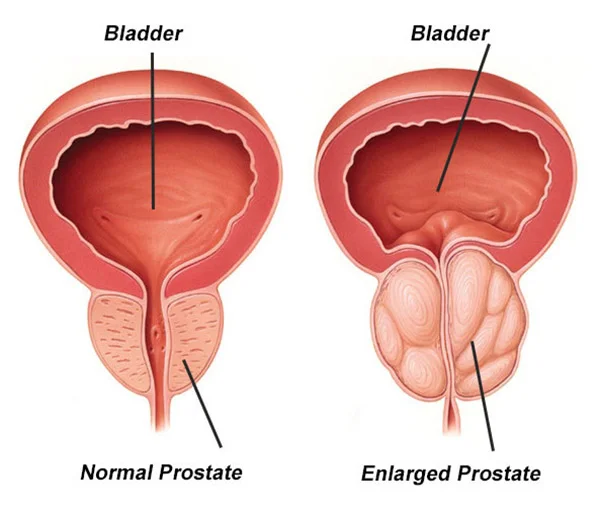
Treating prostate enlargement (benign prostatic hyperplasia, BPH) without medication requires a combination of lifestyle changes, natural remedies, and sometimes non-invasive therapies. these approaches are explained below:
1. Lifestyle Changes
These adjustments in your daily routine can alleviate urinary symptoms caused by an enlarged prostate.
- Fluid Management:
- Reduce fluid intake in the evening to decrease the need to urinate at night (nocturia). This can help avoid disrupting sleep.
- Limit or avoid drinking large amounts of water at once. Instead, sip water throughout the day.
- Limit Caffeine and Alcohol:
- Caffeine (found in coffee, tea, sodas, and chocolate) and alcohol act as diuretics, increasing urine production and potentially irritating the bladder, leading to more frequent urination.
- Reducing or eliminating these can ease urinary urgency and frequency.
- Bladder Training:
- Train your bladder by gradually increasing the time between urinations. This strengthens bladder control and helps reduce the feeling of urgency.
- Start by holding your urine for 5–10 minutes after feeling the need to urinate. Gradually extend the time over weeks.
- Double Voiding:
- After urinating, wait for 30 seconds and try again to completely empty your bladder. This practice can reduce the need for frequent trips to the bathroom, as the bladder may retain some urine after the first void.
- APIE – IMPLEMENTATION, NMC OSCE
- Healthy Weight and Physical Activity:
- Excess weight, especially around the abdomen, can worsen BPH symptoms by increasing pressure on the bladder. Losing weight can relieve this pressure.
- Regular exercise, particularly aerobic activities (such as walking, swimming, or cycling), helps maintain a healthy prostate and improve overall urinary function.
- Pelvic Floor Exercises (Kegel Exercises): Strengthening the pelvic floor muscles can help improve bladder control. To do Kegels, tighten the muscles you use to stop urinating, hold for a few seconds, and then relax. Repeat this several times a day.
2. Dietary Adjustments
Specific dietary changes can promote prostate health and reduce symptoms of BPH.
- Increase Fibre Intake:
- Constipation can worsen BPH symptoms by putting pressure on the bladder. Eating a high-fibre diet (whole grains, vegetables, fruits, and legumes) helps prevent constipation and may ease urinary issues.
- Healthy Fats:
- Omega-3 fatty acids, found in fatty fish (like salmon and sardines), flaxseeds, and walnuts, have anti-inflammatory properties that can support prostate health. Reducing the intake of saturated fats and trans fats (found in fried foods and processed snacks) may also be beneficial.
- Saw Palmetto:
- This herbal supplement is widely used to support prostate health. Some studies suggest that saw palmetto can reduce BPH symptoms by preventing testosterone from being converted into dihydrotestosterone (DHT), which is linked to prostate growth.
- Pumpkin Seeds:
- Pumpkin seeds contain zinc and phytosterols, compounds that can support urinary health. Zinc deficiency is linked to prostate problems, so consuming foods rich in zinc (like pumpkin seeds, shellfish, and legumes) may be helpful.
- Tomatoes and Lycopene:
- Lycopene, an antioxidant found in tomatoes, watermelon, and pink grapefruit, may help reduce prostate inflammation and support prostate health. Lycopene is better absorbed from cooked tomatoes, such as tomato sauce or soup.
3. Heat Therapy (Thermotherapy)

Heat therapy is a minimally invasive procedure that can shrink excess prostate tissue, improving urinary flow and reducing symptoms.
- Transurethral Microwave Thermotherapy (TUMT):
- This outpatient procedure uses microwave energy to generate heat and destroy excess prostate tissue. It’s done through a catheter inserted into the urethra, where the heat is applied to targeted areas of the prostate. This reduces the size of the prostate and improves urinary flow.
- TUMT is a relatively quick procedure, and recovery time is short compared to surgical options.
4. Behavioural Therapies
Behavioural techniques can help improve bladder control and reduce urinary urgency and frequency.
- Biofeedback:
- Biofeedback therapy helps you learn how to control your bladder muscles more effectively. Sensors monitor your muscle activity, and with guidance, you can train yourself to better control bladder function. It can be useful for managing symptoms like urinary urgency and incontinence.
- Timed Voiding:
- Set a schedule to urinate every 2–3 hours, regardless of whether you feel the need to go. Over time, this can help retrain your bladder to hold urine for longer periods, reducing sudden urges.
5. Acupuncture
Acupuncture is a traditional Chinese therapy that involves inserting thin needles into specific points on the body to improve energy flow and stimulate healing.
- Some research suggests acupuncture may help relieve urinary symptoms by reducing inflammation, promoting relaxation, and improving blood flow to the prostate and bladder. It’s typically used as part of a holistic approach to managing BPH.
6. Herbal Supplements
Several herbal supplements have been studied for their potential to reduce BPH symptoms.
- Pygeum:
- Derived from the bark of the African plum tree, pygeum has been traditionally used to treat urinary problems related to BPH. It’s believed to reduce inflammation and improve urinary flow.
- Beta-Sitosterol:
- Beta-sitosterol is a plant-based compound found in fruits, vegetables, and nuts that may help improve urinary symptoms, such as flow rate and the amount of urine left in the bladder after urination. It’s thought to work by reducing inflammation in the prostate.
- HOW TO LOOSE WEIGHT IN A MONTH
7. Avoid Medications That Worsen Symptoms
Some over-the-counter medications can make BPH symptoms worse.
- Decongestants (like pseudoephedrine) and antihistamines (such as diphenhydramine) can constrict the muscles around the urethra, making it harder to urinate. If you have BPH, it’s best to avoid these medications or consult with a healthcare provider before using them.
- FRAUDSTER CARER JAILED IN THE UK
Patientlifematters.com: While these methods can provide relief, the effectiveness of non-medication treatments for BPH varies from person to person. Mild to moderate symptoms may be manageable with lifestyle changes, diet, and natural remedies. However, for severe cases, or if symptoms worsen, it’s important to consult a healthcare professional for further evaluation and possible treatment option